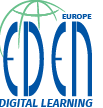
Register Now to Open Education Week 2023, 6-10 March
Open Education Week is a celebration of the global Open Education Movement. Its goal is to raise awareness about the movement and its impact on teaching and learning worldwide, the free and open educational opportunities that exist for everyone, everywhere, right now.
EDEN is endorsing the Open Education Week for the seventh year now organizing EDEN DLE OEW. We want to highlight how open education can help people meet their goals in education, whether that’s to develop skills and knowledge for work, supporting formal studies, learning something new for personal interest, or looking for additional teaching resources.
Join us for the following events – participation is free and open!
Don’t forget to register, as EDEN will issue open badges to acknowledge and appreciate your participation at these events.
Be sure to mark March 6-10 on your calendar!
During the Open Education Week, EDEN DLE offers the following online events:
Description: In this panel session with policymakers and experts on open, online and distance education we will reflect on the present situation regarding open education. Open education is a philosophy, a way of carrying out education with the aim to widen access and participation to everyone by removing barriers and making learning accessible, abundant, and customisable for all. Open education is becoming ever more important in European higher education and on the global level as well due to the fact that digital technologies are one of the main driving forces behind education modernisation. So, why do we still need to discuss the benefits of open education? How pandemic, AI developments (especially chat GPT) and all other issues in the context of open education affected open education in a good or poor way? How can we make open education more visible and actual and did it become mainstream? We do have numerous examples of best practices, great projects on open education, initiatives, documents and policies. Nevertheless, numerous teachers are still unaware of open educational resources and open educational practices and educational institutions do not implement the principles of openness in education or research. Join us and share your views on this topic. Find more information about the event, here.
Moderator: Sandra Kučina Softić
Speakers: Josep M. Duart, Mark Brown, Mpine Makoe, James Glapa-Grossklag, Andreia Inamorato and Michael Gaebel
Description: The webinar builds on the work conducted by members of the Education Innovation Working Group of the Coimbra Group on innovative learning spaces. Hybrid and virtual learning spaces are increasingly planned, designed and evaluated for their rich instructional potential, especially in the context of transnational teaching and learning initiatives, but also as an effect of post-pandemic developments in higher education institutions. Find more about the event, here.
Moderator: Nicoleta Laura Popa
Speakers: François Lecellier and Johannes Müller
Description: This webinar provides an introduction to the concept of open educational practices (OEPs) as a catalyst for innovation. Participants will gain an understanding of how open educational practices can be used to increase access to quality educational resources, foster collaboration, and encourage innovation. We will discuss the benefits of OEPs, the challenges associated with them, and the ways in which they can be implemented in educational contexts. Participants will also learn about the opportunities for educators to create and share open educational resources, as well as the potential impact of OEPs on educational institutions, communities, and society. Finally, we will explore how open educational practices can be used to promote equity, inclusivity, and diversity in education. Find more information about the event, here.
Moderator: Vlad Mihaescu
Speakers: Fabio Nascimbeni, Diana Andone, Carmen Holotescu and Fiona Schmidbauer
Description: In this webinar, we are going to introduce and discuss the project “Extending design thinking with emerging digital technologies” funded by Horizon Europe and Innovate UK. Exten(DT)2 aims to enhance the pedagogical value of design thinking through the use of expressive digital media that are integrated with emerging technologies such as AI and analytics, AR and 3D printing. The project adopts a co-design and co-production approach closely working with teachers across six European countries (Sweden, Greece, UK, Norway, Ireland, Belgium) to design, test and tailor educational interventions that are sustainable and enable development of students’ 21st century skills. The four presentations of this webinar focus on: a) introducing the Exten(DT)2 project, 2) a critical perspective to design thinking, 3) presenting emerging digital technologies and how they can be used to digitise teaching, and 4) discussing how co-designing with teachers can bring innovation to educational curricula. Find more information about the event, here.
Moderator: Christothea Herodotou
Speakers: Marcelo Milrad, Chronis Kynigos and Marianthi Grizioti
Description: This interactive workshop delivered by the University of Zagreb, Faculty of Organisation and Informatics (UZ), School of Medicine, and the Open University UK (OU) will build on several large-scale implementations of learning design and learning analytics, and how you could potentially implement similar approaches in your institution. For example, the OU has been implementing learning design for over 15 years as a structured design, specification, and review process for blended and online courses. The learning design is focused on “what students do” as part of their learning, rather than on “what teachers do” or on what will be taught. Building on this work, UZ has recently developed the Balanced Design Planning (BDP) tool specifically for educators working in hybrid and blended contexts. The tool (www.learning-design.eu/) is more focussed on intended learning outcomes and automated learning analytics and is currently developed and tested with 700+ practitioners from 25+ institutions as part of several European projects (eDesk, Teach4EDU, RAPIDE, iLED), and is publicly available for other institutions to use for free. In this EDEN workshop we aim to showcase what we have learned from implementing the BDP concept and tool, and how we have further updated and fine-tuned the approach based upon both feedback from end users as well as participating institutions. Find more information about the event, here.
Workshop Leaders: Bart Rienties, Blaženka Divjak and Mirza Žižak
